Finnegan’s Wake - The Lyrics
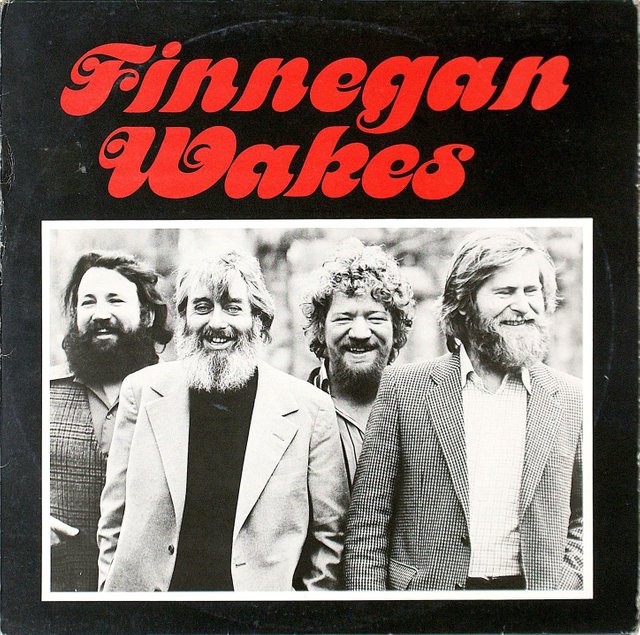
In the two preceding articles in this serious, I attempted to trace the ballad Finnegan’s Wake back to its origins. I was unsuccessful in that endeavour, but I did discover that there were three slightly different versions of the song in print in the mid-1860s, any one of which could be the original.
- Durnal Version: Finigans Wake
- Bryant-Glover Version: Finigan’s Wake
- Poole Version: Tim Finigan’s Wake
Although the basic story of Finnegan’s Wake has remained unchanged over the lifetime of the song, the lyrics have undergone many minor alterations, including, of course, the title. In this article I am going to compare the words of these three versions in the hope of establishing which of them came first.
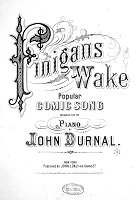
We do not know when Finnegan’s Wake was first written. We do not even know when it first appeared in print. Possibly it was published for the first time in New York by John J Daly in an arrangement by John Durnal. The date on the title page of this edition is 1854, but the copyright notice on the second page of the score bears the date 1864, and I am inclined to believe that 1864 is the correct date. So this is probably not the earliest version of the song that we have. But who knows? Perhaps 1854 is the correct date, after all, so let us start here.
Durnal Version
Finigans Wake
Tim Finigan lived in Walker Street,
He was a gintleman mighty odd,
He was fond of a dhrop o’ the crature nate,
And to rise in the world he carried the hod.
Now Tim one mornin’ got rather full,
His head felt heavy, his hands did shake,
So he fell off the ladder and smashed his skull,
And his friends took home his corpse to wake.
Chorus
With my phillaloo, hubbaboo, whack hurroo boys,
Didn’t we sing till our jaws did ache,
And shout and laugh ’till all was blue
With the fun we had at Finigan’s wake.
They rould him up in a clane white sheet,
And laid him out upon the bed,
With eight dipped candles around his feet,
And a dozen at laste around his head;
Miss Biddy O’Brian began to cry,
Mrs Finigan cried “asthore machree,
Millia murther Tim darlin’ och! why did you die?”
“Arrah none o’ yer prate” sez Judy Mc Gee.
Chorus
Thin Peggy O’Connor took up the cry,
“Now, Judy,” sez she, “yer wrong I’m sure;”
But Judy soon gev her a belt on the eye,
Which left her sprawlin’ on the flure.
Both sides in the row did soon engage,
(’Twas woman to woman and man to man)
Shillelagh’s and “nails” wor all the rage,
An’ a “tarin’” ruction soon began.
Chorus
Micky Mulvany jist show’d his head,
When Tim Donavan flung a full quart at him,
It missed him, an’—fallin’ on the bed—
The liquor was spilt on the face of Tim;
Now the sperrits new life gev the corpse, my joy,
Tim jump’d like a Trojan from the bed,
Cryin’—whilst he walloped aitch girl an’ boy—
“Tare an’ ages, yer sowls, d’ye think I’m dead?”
Chorus
Glossary
Walker Street A street in New York
gintleman gentleman
mighty odd very odd—but why is Tim odd?
dhrop drop
crature creature, a slang term for whiskey
nate neat, undiluted
hod a builder’s receptacle for carrying bricks over the shoulder
full drunk
phillaloo Irish interjection, loud wail, cry of lamentation (cf Úalu at RFW 003.24)
hubbaboo Irish interjection, loud wail, cry of lamentation
whack hurroo a cry expressive of triumph or exultant excitement
’till all was blue to drink till all is blue = to become very drunk
rould rolled
clane clean
dipped candles hand-made by repeatedly dipping a weighted wick in melted wax
at laste at least
asthore machree Irish terms of endearment: a stór [my treasure], mo chroí [my heart]
Millia murther Irish interjection: míle murdar [a thousand murders]
och! Irish interjection: Och! [Alas!]
Arrah! Irish interjection: Ara, an expression of impatience found at the beginning of a statement
prate prattle, chatter
sez says
gev gave
flure floor
Shillelagh’s Irish cudgels traditionally made of blackthorn
“nails” “Finger nails, the women’s weapons, of course”
wor were
tarin’ tearing, great, huge
ruction a disturbance, a riot
jist just
sperrits spirits
aitch each
Tare an’ ages Tears and agues! (An Irish oath, referring to Christ’s tears and Passion)
yer sowls your souls
Bryant-Glover Version
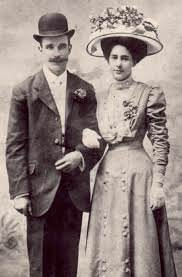
The lyrics of the Durnal Version are certainly crude and unpolished. Some of the lines seem forced. It does strike me as a crude attempt to reconstruct from memory a song one has heard a few times. William Pond & Co published a slightly different version of Finigan’s Wake in 1864. The arranger, Charles W Glover, died on 23 March 1863, which establishes a terminus ante quem for the creation of this version. As is the case with the Durnal Version, we do not know who wrote the words. Possibly it was a member of Bryant’s Minstrels, though other songs sung by Dan Bryant and published by Wm Pond & Co identify the writer and composer. For example, the sheet music for Lanigan’s Ball, which was published in 1863, attributes the words to Tony Pastor and the music to Neil Bryant. The lack of any such attributions on the sheet music for Finigan’s Wake may mean that the publishers simply did not know who wrote the original version of the song.
Finigan’s Wake
Tim Finigan liv’d in Walker Street,
An Irish gintleman mighty odd,
He’d a beautiful brogue so rich and sweet
And to rise in the world he carried the hod.
But you see he’d a sort of a tipling way:
With a love for the liquor poor Tim was born,
And to help him through his work each day,
He’d a drop of the creature ev’ry morn.
Chorus
Whack, hurrah, dance to your partners,
Welt the flure your trotters shake,
Isn’t it the truth I’ve told ye,
Lots of fun at Finigans wake.
One morning Tim was rather full,
His head felt heavy, which made him shake,
He fell from the ladder and broke his skull;
So they carried him home his corpse to wake:
They rolled him up in a nice clean sheet,
And laid him out upon the bed,
With fourteen candles round his feet,
And a couple of dozen round his head.
Chorus
His friends assembled at his wake,
Missus Finigan called out for the lunch:
First they laid in tay and cake,
Then pipes and tobacky and whiskey punch.
Miss Biddy O’Neil began to cry:
“Such a purty corpse did ever you see:
Arrah! Tim avourneen, an’ why did ye die?”
“Och, none of your gab,” sez Judy Magee.
Chorus
Thin Peggy O’Connor took up the job,
“Arrah, Biddy,” says she, “ye’er wrong I’m shure.”
But Judy then gave her a belt on the gob.
I left her sprawling on the flure.
Each side in war did soon engage:
’Twas woman to woman and man to man;
Shillelah law was all the rage,
And a bloody ruction soon began.
Chorus
Mickey Mulvaney raised his head,
When a gallon of whiskey flew at him.
It missed him—and hopping on the bed,
The liquor scattered over Tim!
Bedad! he revives! see how he raises!
An’ Thimothy jumping from the bed,
Cries, while he lathered around like blazus:
“Bad luck till yer souls, d’ye think I’m dead!”
Chorus
Glossary
brogue Irish accent
welt the flure beat the floor (with your feet)
trotters feet
tay tea
tobacky tobacco. You can’t have an Irish wake without snuff.
whiskey punch whiskey diluted with boiling water and sweetened with sugar
purty pretty
avourneen Irish term of endearment: a mhuirnín, my dear
shure sure
Shillelah Shillelagh
Bedad! By God! (altered to avoid taking the Holy Name)
Thimothy Timothy (in Irish the [t] is dental rather than alveolar)
lathered beat, struck, hit
like blazus like the devil (blazes = the fires of Hell)
till yer souls to your souls
Poole Version
The lyrics of the Bryant-Glover Version are generally more sophisticated that those of the Durnal Version. Does that imply that this is a later, improved version? Or was the Durnal version a cheap pirated edition? Some of the so-called bad quartos of Shakespeare’s plays are vastly inferior to the Bard’s originals precisely because they were cheap knock-offs made on the fly by hacks.
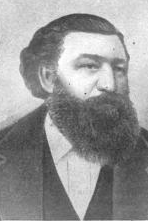
The Poole Version also appeared in print in 1864 (though incorrectly identified as the version Dan Bryant sang). Tim’s first name has been added to the title, but otherwise these lyrics are fairly close to those of the Bryant-Glover Version. In fact, the Poole Version and the Bryant-Glover Version are so similar that it is reasonable to assume that one of them was based on the other—but which came first? Significantly, the words of the Poole Version were expressly attributed to John F Poole, while the music was identified as a traditional tune, The French Musician:
Tim Finigan’s Wake
Tim Finigan lived in Walker street,
A gentleman Irishman—mighty odd—
He’d a beautiful brogue, so rich and sweet,
And to rise in the world he carried the hod.
But you see, he’d a sort of a tippling way—
With a love for the liquor poor Tim was born,
And to help him through his work each day,
He’d a drop of the craythur’ every morn.
Chorus
Whack, hurrah! blood and ’ounds, ye sowl ye!
Welt the flure, yer trotters shake;
Isn’t it the truth I’ve tould ye,
Lots of fun at Finigan’s wake!
One morning Tim was rather full,
His head felt heavy, which made him shake;
He fell from the ladder and broke his skull,
So they carried him home his corpse to wake.
They rolled him up in a nice clean sheet,
And laid him out upon the bed,
With fourteen candles round his feet,
And a couple of dozen around his head!
Chorus
His friends assembled at his wake,
Missus Finigan called out for the lunch;
First they laid in tay and cake,
Then pipes and tobaccy and whiskey punch.
Miss Biddy O’Brien began to cry:
“Sich a purty corpse did ever you see?
Arrah! Tim avourneen, an’ why did ye die?”—
“Och, none o’ yer gab!” says Judy Magee.
Chorus
Then Peggy O’Connor took up the job:
“Arrah, Biddy,” says she, “ye’re wrong I’m sure.”
But Judy then gave her a belt on the gob,
And left her sprawling on the flure.
Each side in war did soon engage,
’Twas woman to woman and man to man;
Shillalah-law was all the rage,
And a bloody ruction now began.
Chorus
Mickey Mulvaney raised his head,
When a gallon of whiskey flew at him.
It missed him, and, hopping on the bed,
The liquor scattered over Tim!
Bedad! he revives! see how he raises!
And Timothy, jumping from the bed,
Cries, while he lathered around like blazus,
“Bad luck till yer souls, d’ye think I’m dead?”
Chorus
Glossary
blood and ’ounds! a traditional oath: Christ’s blood and wounds!
ye sowl ye pejorative form of address
tould told
Lilting
The first line of the chorus—
With my phillaloo, hubbaboo, whack hurroo boys
Whack, hurrah, dance to your partners,
Whack, hurrah! blood and ’ounds, ye sowl ye!
—is an example of lilting. It does not really mean anything, but is rather an outpouring of unbridled excitement. Lilting is also used when there is a hole in the ballad: that is, when the singer can’t remember the words. Modern versions of the song include numerous variants on these nonsensical phrases: Whack fol-de-dah is particularly popular.
An Anachronism or a Hole in the Ballad?
The Durnal version kills off Tim and introduces his wake in the first stanza—before the chorus, which describes the wake. In the other two versions, however, Tim only falls from the ladder in the second stanza. This means that we are first told of all the fun at Finigan’s wake while Tim is still alive and well. Does this mean that the Durnal Version is the original, and the later versions introduced this anachronism? Or did the writer of the Durnal version simply forget the lines about Tim’s beautiful brogue and his habit of drinking whiskey for breakfast?
“Nails”
In the penultimate stanza of the Durnal Version, the word “nails” is printed inside quotes, and a footnote at the bottom of the page (reproduced in the glossary above) explains that these are the women’s finger nails. Did the writer of that line also write the footnote? Was this a new addition to the song that required an explanation?
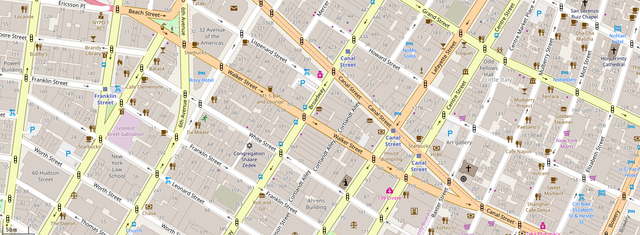
Walker Street
Tim Finigan lived in Walker Street. Being that the song hails from New York, it is only natural that Tim should live in the Big Apple. Walker Street is nestled between Chinatown and TriBeCa in lower Manhattan. It begins at Tribeca Park, adjacent to West Broadway and Beach Street, and from there it runs in a southeasterly direction for about 650 m until it joins Canal Street. It is named for Benjamin Walker, an English-born officer of the American Revolutionary War, and later a Congressman for New York’s 9th District.
In later versions of the song, Walker Street was replaced with a variety of alternatives, some simple corruptions of Walker Street, others local substitutes:
Several uncredited song sheets were published by Philadelphia companies. Two such sheets were entitled “Tim Finigan lived on Market Street” (Philadelphia’s main street), and one was called “Tim Finigan lived in Ballymacree”. (Meehan 71. See also Wolf 157)
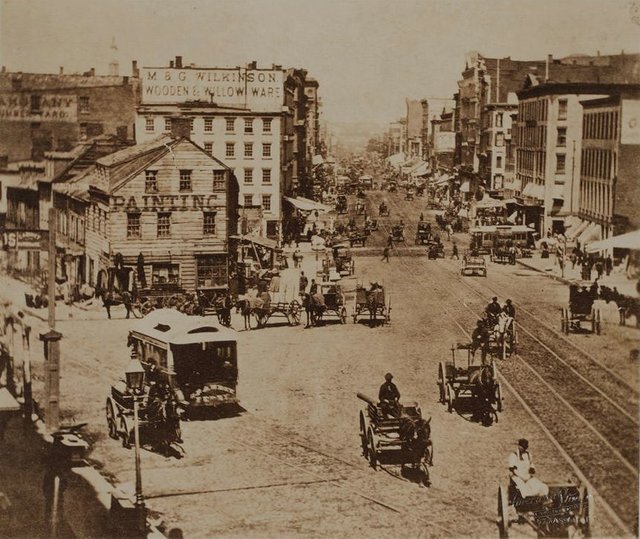
In Ireland, Walkin Street is the commonest form one hears. There is a Walkin Street in Kilkenny, but the name is probably just a corruption of Walker Street. Watling Street, which is down the road from Guinness’s brewery in Dublin, is sometimes substituted. Another recent variant is Rankin Street, which is in St John’s, Newfoundland, and is the name of a local traditional group who have added the song to their repertoire.
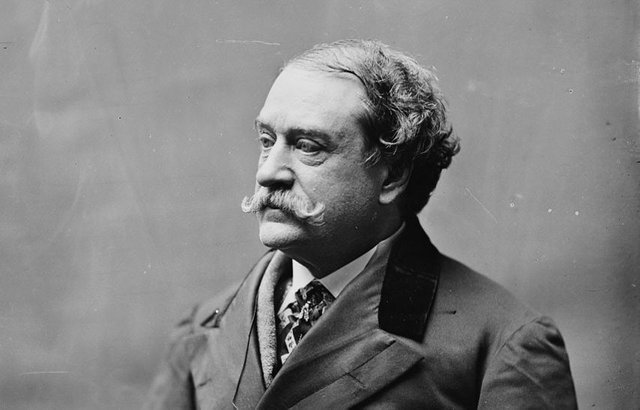
Candles
All three early versions of the song have candles at the head and feet of Tim’s corpse. Modern versions have whiskey at his feet and porter [Guinness] at his head. The candles, of course, are taken from John Brougham’s song The Fine Ould Irish Gintleman (1845), which was the immediate inspiration for Finigan’s Wake:
With half a dozen candles at his heels and two or three dozen more or less about his head.
The Durnal Version’s eight dipped candles sounds to my ears like a later evolution of this image.
Rhyme
In the Poole Version, the four lines of the chorus rhyme (more or less) abab:
Whack, hurrah! blood and ’ounds, ye sowl ye!
Welt the flure, yer trotters shake;
Isn’t it the truth I’ve tould ye,
Lots of fun at Finigan’s wake!
But in the other two versions, the first and third lines of the chorus don’t rhyme:
Durnal Version
With my phillaloo, hubbaboo, whack hurroo boys,
Didn’t we sing till our jaws did ache,
And shout and laugh ’till all was blue
With the fun we had at Finigan’s wake.
Bryant-Glover Version
Whack, hurrah, dance to your partners,
Welt the flure your trotters shake,
Isn’t it the truth I’ve told ye,
Lots of fun at Finigans wake.
Does this mean that the Poole Version came first and the other versions are the imperfect copies? Or did John F Poole improve the original chorus by “correcting” the faulty rhyme of the original? Note, by the way, that if the word boys is dropped from the Durnal Version, the lines will rhyme. Today, most performers sing dance to your partner[s], which could be cited to show that the Bryant-Glover Version came later and ousted the earlier versions.
Who left her sprawling on the flure?
Another line that raises questions is:
Durnal Version
Which left her sprawlin’ on the flure.
Bryant-Glover Version
I left her sprawling on the flure.
Poole Version
And left her sprawling on the flure.
Here, the Bryant-Glover Version does not make any sense. The intrusion of the first-person narrative is completely out of place. It sounds like a misheard line. Is this version, then, the imperfect copy and one of the other two the original?
Personae Dramatis
There are also interesting variations in the names of the personae dramatis:
| Durnal | Bryant-Glover | Poole |
|---|---|---|
| Tim Finigan | Tim Finigan | Tim Finigan |
| Biddy O’Brian | Biddy O’Neil | Biddy O’Brien |
| Mrs Finigan | Missus Finigan | Missus Finigan |
| Judy Mc Gee | Judy Magee | Judy Magee |
| Peggy O’Connor: | Peggy O’Connor | Peggy O’Connor |
| Micky Mulvany | Mickey Mulvaney | Mickey Mulvaney |
| Tim Donavan | - | - |
Unfortunately, none of this helps us establish which version came first.
Conclusion
Without more information, it is still impossible to pin down the origins of the song. For every argument that favours one version, there is another that favours a different version. And there is always the possibility that the true original preceded all three of these printed versions and was written by an unknown amateur. My gut feeling is that the Durnal Version is a crude copy of an already extant song, but further than that I dare not go.
In the next installment, I will try to discover how Joyce fits into the story of Finigan’s Wake
References
- John Brougham, The Fine Ould Irish Gintleman, George P Reed, Boston (1845)
- James Joyce, Finnegans Wake, The Viking Press, New York (1958, 1966)
- Jane S Meehan, Tim Finigan’s Wake, A Wake Newslitter, Volume 13, Number 4, pp 69-73, University of Essex, English Department, Colchester (1976)
- Tony Pastor, Tony Pastor’s Book of Six Hundred Comic Songs and Speeches, Dick & Fitzgerald, New York (1867)
- Danis Rose, John O’Hanlon, The Restored Finnegans Wake, Penguin Classics, London (2012)
- Robert M De Witt, Bryants’ New Songster: Comprising a Careful Selection of the Newest and Most Popular Sentimental and Comic Songs, Lately Introduced by the Bryant Brothers, Robert M De Witt, New York (1864)
- Edwin Wolf 2nd, American Song Sheets, Slip Ballads and Poetical Broadsides, 1850-1870, The Library Company of Philadelphia, Philadelphia (1963)
Image Credits
- Finnegan Wakes (The Dubliners): © 1984 Sonas Records, Fair Use
- Finigans Wake: Lester S Levy Sheet Music Collection, Public Domain
- C W Glover: IMSLP, Petrucci Music Library, Public Domain
- John F Poole: Public Domain
- Walker Street, New York: © OpenStreetMap contributors, Creative Commons License
- The Junction between Walker Street (left) and Canal Street (c 1870): Public Domain
- John Brougham: Wikimedia Commons, Matthew Brady (photographer), Library of Congress, Brady-Handy Photograph Collection, Public Domain
Useful Resources
- The Traditional Tune Archive
- Finnegan’s Wake, Duke University Libraries, Digital Collections
- Finigans Wake
- Walker Street
- Joyce Tools
- FWEET
- The James Joyce Scholars’ Collection
- FinnegansWiki
- Annotated Finnegans Wake (with Wakepedia)

Its a great one. Finegun is so much popular
Very good one
Excellent post dear @harlotscurse
Wonderful history D:) @harlotscurse
i love your all post
thanks you for sharing this post
that's a great literature...
you are proud of ireland..
love your post dear.
@upvote done
nice literature...
Really it's a learning post..
👌👌👌👌👌
@upvoted
hi dear @harlotscurse . how are you.
i am new to your blog..
i just #Resteem and #Upvote..
and
nice literature...
Really it's a learning post..👌👌👌